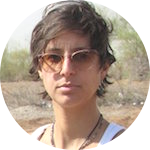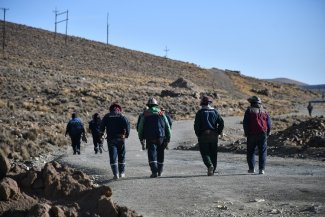Oluwafemi is one of the lucky formerly undocumented sub-Saharan African migrants in Morocco who has been regularised.
Seven years ago, 48-year-old Oluwafemi (not his real name) embarked on a journey of over 6640 kilometres, overcoming cold, thirst, hunger and extreme danger, in an attempt to reach Europe to make a better life for himself.
Born in Ibadan in Oyo State, south-western Nigeria, Oluwafemi used to work as an electrical engineer for the Navy until he was dismissed for leading protests against poor working conditions in the late 1990s. Years of unemployment followed before he eventually took the drastic decision to leave his mother and two sisters to look for work in Europe.
He knew the route would be long, difficult and risky. But still he went. Like hundreds of thousands of migrants before and after him, Oluwafemi travelled through Niger and traversed the Saharan desert, risking his life through perilous borders like the one that divides Algeria and Morocco (which has been closed since 1994), before finally arriving in Morocco.
“My family wasn’t aware of my trip. I had no idea where I would go in Europe. I just wanted a better life.”
From Morocco, Oluwafemi planned to reach Europe by boat via the Mediterranean Sea or by climbing the fences that fortify the autonomous Spanish enclaves of Ceuta and Melilla next to the Moroccan border. “I tried several times to climb the fences in Melilla,” says Oluwafemi. “I was never able to cross, though. If you are caught, you are beaten. You have to train and prepare yourself, you have to jump and move fast,” he recalls.
Eventually, after months of trying, he gave up on his dreams of Europe and decided to stay in Morocco.
“European Eldorado”
Oluwafemi tells Equal Times his story from Oujda, the north-eastern town of Morocco with a population of 450,000 people where he currently lives. Although he has held a legal resident permit since 2014, he still fears reprisals from the police.
This is what the struggle to reach the “European Eldorado” looks like says Daniela, a Spanish human rights activist working at a local organisation between Melilla and the Moroccan city of Nador, just 10 kilometres away.
Daniela spoke to Equal Times on condition on anonymity, as both undocumented migrants and the human rights NGOs that try to help them are subject to harassment and violence from the local authorities. Foreign human rights workers even face expulsion.
At present, there are no safe and legal ways for Morocco’s undocumented migrants to enter Europe. “This means that migrants die at sea. The fences don’t stop them from attempting to climb. It only increases their suffering,” Daniela says. Those who aren’t successful in their attempts to reach Europe – which is the vast majority – end up staying in Morocco, where for years they had no rights, no shelter and no opportunities.
Thousands of people still live on the outskirts of cities like Nador, Tangier and Rabat in inhumane conditions in forests, caves and on mountains because they are desperate to avoid the violence of security forces, and because they have nowhere else to go. “There is no more refoulement or deportation, but the forced displacement is still ongoing,” Daniela says.
But in recent years, this North African country, which was once considered a transit nation, has gradually become a destination and host country, according to Jean-Paul Cavaliéri, a representative of the United Nations High Commissioner for Refugees (UNHCR) in Morocco.
“It is becoming more difficult and more dangerous to cross the sea. Some people make the choice to stay in Morocco, after all this country offers some protection and guarantees. It is not the highest standards that you may find in the world, but there’s basic protection and, certainly, a safe place for asylum seekers,” he says.
A more liberal immigration policy
In 2013, King Mohammed VI of Morocco announced a new, more liberal immigration policy that would allow for the regularisation of undocumented migrants. “The country adopted an open policy that ensures human rights replacing the security approach it used to have before,” says Mohamed Khachani, president of the Moroccan Association for Studies and Research on Migration, based in the capital Rabat.
Although regularisation was a limited process that took place over a period of one year, 92 per cent of the 27,643 people who applied were given the right to stay in Morocco, according to official data seen by Equal Times.
There are a number of theories as to why Morocco became the first Arab country to engage in a comprehensive migration policy. Observers have commented that the Arab Spring might have been an impetus for a number of democratic reforms ushered in by the king, while others have pointed to pressure from the European Union as well as the tensions that followed the deaths of two migrants during a police raid in Tangier.
“This is an unprecedented campaign in the region. It can indeed be a positive example and a model, not just for other Arab countries, but for many countries in the Global South that have similar issues. The EU hailed Morocco’s immigration policy and promised to help fully implement it,” says Driss El Yazami, president of the National Human Rights Council of Morocco.
The council is responsible for issuing the recommendations that formed the basis of the king’s immigration reforms.
The amount of funding the EU is providing Morocco is unclear but the support is focused specifically on capacity building and professional training for migrants.
Despite all efforts, an estimated 40,000 people still live in Morocco without papers. Migrants are part of the landscape now, says Cavaliéri.
“Moroccans have seen them passing through, begging in the streets to reach Europe. Now those people decided to stay, they’re not just passing by. They are neighbours, schoolmates, they’re sitting at the mosque. They are here to stay. The government is conscious of that,” he says.
Although Morocco is leading the way in the Middle East North Africa (MENA) region when it comes to the establishment of a proper regularisation system for migrants, they are struggling with very limited resources. “We are seven people to receive 300 and 400 requests for asylum seeking per month,” says Cavaliéri.
Racism, housing and work
Oluwafemi was one of the lucky ones. After years of destitution and sleeping in makeshift shelters while hiding from the police, he can finally live “properly”. “It is peaceful here [in Oujda]. There’s no violence. The only thing is that there’s unemployment and the standard of living is poor.”
So far, despite his skills and training, Oluwafemi hasn’t been able to secure a regular job or a permanent contract. Like most sub-Saharan African migrants, he can only get irregular, informal work on which he scrapes by with just enough to pay for the rent on his room. Language is a huge barrier. He speaks English but only a bit of French and very little Arabic.
And despite the best efforts of Morocco’s new migration policies, racism is also a major issue, particularly when it comes to work and accommodation.
For example, black African migrants can be paid as much as four times less what a Moroccan national will get for the same job, according to Hassane Ammari, an activist at the Association Internationale pour les Migrants Oujda (AIMO), or the International Association for Migrants in Oujda.
And when it comes to accommodation, migrants are often charged higher rents, asked to pay bigger deposits and can face eviction at any time because unscrupulous landlords know that being undocumented means they have no access to legal assistance.
Having worked with migrants since 2001, Ammari says he has come to the conclusion that regularisation is not the final solution. After one year, a migrant has to request for renewal of his or her papers and also needs to show proof of employment, which is incredibly difficult for migrants like Oluwafemi to obtain. As a consequence, previously documented migrants can easily return to being undocumented.
There is, of course, one more issue. “I always tell the authorities that regularisation is only a small step. The important thing here is integration. We’re talking about economic, political, social and cultural integration. We’re solving a problem for the EU, but we don’t have enough resources to do it,” highlights Khachani.
His research team conducted a survey which indicated that more than 60 per cent of Moroccans would employ a migrant worker. Official data showed that 20 per cent of regularised migrants under the new policy have higher education.
“It is a blessing that migrants come and want to stay here,” he says.
The key now is figuring out a way to make good use of their skills and the other positive contributions they are willing to make.










